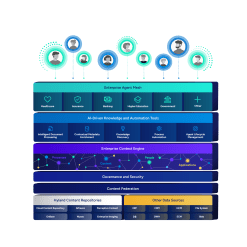Rotterdam Municipal Authority
Digital file collaboration at the Rotterdam Municipal Authority

Harness the power of a unified content, process and application intelligence platform to unlock the value of enterprise content.
Learn more
Automate your document-centric processes with AI-powered document capture, separation, classification, extraction and enrichment.
Learn about Hyland IDPIt's your unique digital evolution … but you don't have to face it alone. We understand the landscape of your industry and the unique needs of the people you serve.
 Overview of industries
Overview of industries
Countless teams and departments have transformed the way they work in accounting, HR, legal and more with Hyland solutions.
 Overview of departments
Overview of departments
We are committed to helping you maximize your technology investment so you can best serve your customers.
 Overview of services
Overview of services

Discover why Hyland is trusted by thousands of organizations worldwide.
Hear from our customers
Our exclusive partner programs combine our strengths with yours to create better experiences through content services.
Overview of partners
Find resources to power your organization's digital transformation.
Browse the resource center
Hyland connects your content and systems so you can forge stronger connections with the people who matter most.
Learn about HylandWith our modern, open and cloud-native platforms, you can build strong connections and keep evolving.
 Dig deeper
Dig deeper
Reading time minutes
Digital file collaboration at the Rotterdam Municipal Authority

Digital collaboration on a single file is a topic that is more relevant now than ever. But how do you achieve this in an organisation in which so many documents are created and used every day? How do you maintain an overview and keep control? The Rotterdam Municipal Authority went looking for answers to these very questions.
Digital collaboration is rapidly becoming the norm, which is why the municipality of Rotterdam began looking for a solution to support digital file collaboration. Its main focus points were traceability, completeness, security and compliance with legislation and regulations. It wanted to implement a group-wide document management system that could guarantee these four key areas by means of authorisations, audit trails, archive management, user-friendly interfaces and process automation, for example.
A further important pillar in digital collaboration is the automation of processes involving administrative decision-making files. A generic integration load also provides a link to other task applications and services, such as digital signing and document generation.
The main priority was for the solution to provide users with optimum support in order to encourage digital file collaboration and ensure that the municipality is in control of the information. With a user-centred approach, we involved the user in all phases of the process. By conducting user experience (UX) research and using a design system, we created a consistent, accessible and user-friendly solution for the target group.
Of course, we also thought about the management side. By employing an ‘archiving by design’ approach from the outset, compliance with legislation and regulations concerning the storage and destruction of information is ensured from the moment a new file is created. For example, consideration is given in advance to how files are to be properly archived at the end of the term, which is extremely convenient. As a result, control over the information has increased enormously in a sustainable and future-oriented solution.
The municipality of Rotterdam is also fit for the future from a technology point of view. With Alfresco’s modern cloud-native platform, the municipality has acquired a solution that can be built on in the coming years. By applying a microservice architecture, we have implemented a scalable and future-proof solution. What’s more, Alfresco is open source and uses open standards.
— Bart Ballaux
The new platform ensures that employees can easily obtain the information they need to do their jobs well. Digitising and automating processes had made them faster and provided greater insight. Thanks to the fact that legislation and regulations regarding the retention and destruction of data have been taken into account from the start, control over the information hasincreased enormously. The municipality of Rotterdam is now able to ensure the four key focus points: completeness, traceability, security and compliance with legislation and regulations. And perhaps most importantly – the users are happy and positive about this new solution!
From the start, the key to success has been the cooperation between the municipality of Rotterdam and Incentro. Within this blossoming partnership, both parties have made every effort to make an impact together. With a new way of agile working for the municipality of Rotterdam, we developed the solution in an iterative process. As specialists in the Alfresco platform, our Incentronauts have done their utmost to challenge the municipality and build a great solution. Involvement of end users and focus on the user experience are key to this process so that we can continuously incorporate the feedback from the organisation in the next iteration.
— Maarten van Veelen